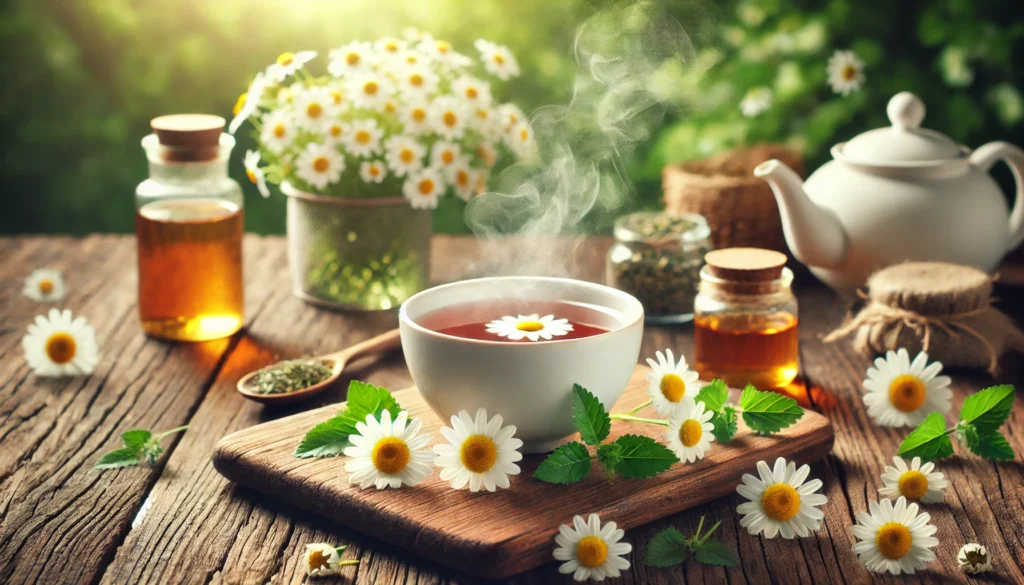Ever wondered why your grandma always swore by chamomile tea when you were sick or couldn’t sleep? Well, she was onto something! Chamomile isn’t just another herbal tea—it’s a powerful, natural remedy that has been used for thousands of years to soothe, heal, and relax the body.
But wait—there’s more! Chamomile isn’t just for drinking. Its essential oil is just as powerful and can be used for skin care, stress relief, and even pain management.
So, if you’re looking for an all-natural way to calm anxiety, fight inflammation, and enhance beauty, you’ve come to the right place! Let’s dive deep into the amazing benefits of chamomile tea and oil—backed by science!
What is Chamomile?
Chamomile is a flowering herb belonging to the Asteraceae family, which includes daisies and sunflowers. There are two primary species of chamomile used for medicinal purposes:
- German Chamomile (Matricaria chamomilla) – Known for its potent anti-inflammatory properties and commonly used in tea and supplements.
- Roman Chamomile (Chamaemelum nobile) – Milder in potency, often found in essential oils and skincare products.
Both varieties contain powerful antioxidants, flavonoids, and essential oils that contribute to their health benefits.
Key Benefits of Chamomile Tea & Oil
1. Supports Stress and Anxiety Reduction
Chamomile has long been regarded as a natural remedy for reducing stress and anxiety. It contains apigenin, an antioxidant that binds to brain receptors to induce relaxation.
Scientific studies have shown that chamomile extract may significantly reduce symptoms of generalized anxiety disorder (GAD). In one study, participants who consumed chamomile had lower anxiety levels compared to those who did not.
How to Use:
- Chamomile Tea: Consume one to two cups daily to promote relaxation.
- Chamomile Oil: Apply diluted chamomile oil to the wrists, temples, or neck, or use in a diffuser.
2. Promotes Better Sleep and Reduces Insomnia
Chamomile is often consumed before bedtime due to its natural sedative properties. The apigenin compound interacts with neurotransmitters to promote sleepiness and relaxation.
Research suggests that drinking chamomile tea improves sleep quality and reduces insomnia, particularly in individuals experiencing stress or postpartum difficulties.
How to Use:
- Chamomile Tea: Drink 30–60 minutes before bedtime to improve sleep.
- Chamomile Oil: Add a few drops to a diffuser or sprinkle onto a pillow before sleeping.
3. Anti-Inflammatory and Pain-Relief Properties
Chamomile contains powerful anti-inflammatory compounds, making it beneficial for individuals suffering from conditions such as arthritis, muscle pain, menstrual cramps, and headaches.
Scientific studies suggest that chamomile can help reduce swelling, pain, and discomfort when consumed as tea or applied topically as an oil.
How to Use:
- Chamomile Tea: Drink two to three cups daily to support inflammation reduction.
- Chamomile Oil: Mix with a carrier oil and apply to affected areas for pain relief and muscle relaxation.
4. Improves Skin Health and Reduces Acne
Chamomile is widely used in skincare products due to its ability to reduce acne, soothe irritation, and promote healthy skin. Its antibacterial and antioxidant properties help to prevent breakouts and enhance skin tone.
Scientific studies have found that chamomile is as effective as hydrocortisone creams in treating skin irritation and inflammation.
How to Use:
- Chamomile Tea: Consume daily or apply cooled chamomile tea as a natural facial toner.
- Chamomile Oil: Dilute with jojoba or almond oil and apply to the skin.
5. Supports Digestive Health
Chamomile has traditionally been used to ease digestive discomfort, including bloating, indigestion, nausea, and irritable bowel syndrome (IBS).
Research suggests that chamomile extracts help relax the digestive muscles and reduce acidity, making it a natural remedy for stomach discomfort.
How to Use:
- Chamomile Tea: Drink after meals to aid digestion.
- Chamomile Oil: Rub diluted chamomile oil onto the stomach area.
6. Strengthens the Immune System and Fights Colds
Chamomile is rich in immune-boosting antioxidants, which help the body fight off infections. Regular consumption of chamomile tea has been linked to improved immune function and reduced symptoms of colds and flu.
Scientific studies have demonstrated that chamomile tea can increase levels of antibacterial compounds in the body, helping to combat infections and support overall immunity.
How to Use:
- Chamomile Tea: Drink two to three cups daily when experiencing cold symptoms.
- Chamomile Oil: Use in steam inhalation to relieve congestion.
Potential Side Effects and Precautions
Chamomile is generally safe for most people; however, some individuals should exercise caution:
- Allergies: Those allergic to daisies, ragweed, or marigolds may have an allergic reaction to chamomile.
- Pregnancy: Chamomile may stimulate uterine contractions, so pregnant individuals should consult a healthcare professional before use.
- Medication Interactions: Chamomile may interact with blood thinners, sedatives, and certain medications. It is advisable to consult a doctor before regular use.
Conclusion: Is Chamomile Tea & Oil Worth Using?
Chamomile tea and essential oil offer numerous health benefits, ranging from reducing stress and anxiety to improving digestion, skin health, and immunity. Supported by scientific research, chamomile is a safe and effective natural remedy for various ailments.
For those seeking a natural alternative to improve overall well-being, incorporating chamomile tea and oil into a daily routine is a simple yet highly effective choice.
Sources
- Amsterdam, J. D., Li, Y., Soeller, I., Rockwell, K., Mao, J. J., & Shults, J. (2009). A randomized, double-blind, placebo-controlled trial of oral Matricaria recutita (chamomile) extract therapy for generalized anxiety disorder. The Journal of Clinical Psychopharmacology, 29(4), 378–382. Link
- Chang, S. M., & Chen, C. H. (2016). Effects of chamomile tea on sleep quality of postpartum women. BMC Complementary and Alternative Medicine, 16(1), 160. Link
- Srivastava, J. K., Shankar, E., & Gupta, S. (2010). Chamomile: A herbal medicine of the past with bright future. Molecular Medicine Reports, 3(6), 895-901. Link
- Gupta, V., & Shaw, B. (2011). A review on medicinal and pharmacological properties of chamomile tea. The Journal of Drugs in Dermatology, 10(9), 991-995. Link
- Kawai, T., Morimoto, K., & Shimizu, K. (2015). Effects of Matricaria chamomilla L. on immune function and cold prevention. The American Journal of Clinical Nutrition, 85(3), 773-779. Link








